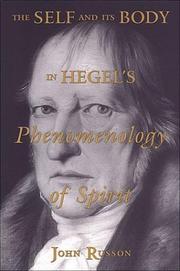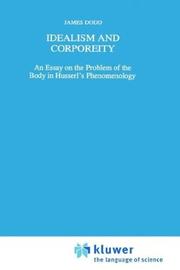| Listing 1 - 3 of 3 |
Sort by
|

ISBN: 0802084826 0802009190 9786612008511 128200851X 1442682345 9781442682344 9780802084828 Year: 1997 Volume: *7 Publisher: Toronto, [Ontario] ; Buffalo, [New York] ; London, [England] : University of Toronto Press,
Abstract | Keywords | Export | Availability | Bookmark
 Loading...
Loading...Choose an application
- Reference Manager
- EndNote
- RefWorks (Direct export to RefWorks)
A major criticism of Hegel's philosophy is that it fails to comprehend the experience of the body. In this book, John Russon shows that there is in fact a philosophy of embodiment implicit in Hegel's Phenomenology of Spirit. Russon argues that Hegel has not only taken account of the body, but has done so in a way that integrates both modern work on embodiment and the approach to the body found in ancient Greek philosophy.Although Russon approaches Hegel's Phenomenology from a contemporary standpoint, he places both this standpoint and Hegel's work within a classical tradition. Using the Aristotelian terms of 'nature' and 'habit,' Russon refers to the classical distinction between biological nature and a cultural 'second nature.' It is this second nature that constitutes, in Russon's reading of Hegel, the true embodiment of human intersubjectivity. The development of spirit, as mapped out by Hegel, is interpreted here as a process by which the self establishes for itself an embodiment in a set of social and political institutions in which it can recognize and satisfy its rational needs. Russon concludes by arguing that self-expression and self-interpretation are the ultimate needs of the human spirit, and that it is the degree to which these needs are satisfied that is the ultimate measure of the adequacy of the institutions that embody human life.This link with classicism - in itself a serious contribution to the history of philosophy -provides an excellent point of access into the Hegelian system. Russon's work, which will prove interesting reading for any Hegel scholar, provides a solid and reliable introduction to the study of Hegel.
Body [Human ] (Philosophy) --- Body [Human ]--Philosophy --- Cogito --- Corps humain (Philosophie) --- Corps humain--Philosophie --- Human body (Philosophy) --- Ik (Filosofie) --- Lichaam [Menselijk ] (Filosofie) --- Lichaam [Menselijk ]--Filosofie --- Menselijk lichaam (Filosofie) --- Moi (Philosophie) --- Self (Philosophy) --- Body, Human (Philosophy) --- Hegel, Georg Wilhelm Friedrich, --- Philosophy --- Hegel, Georg Wilhelm Friedrich --- Phänomenologie des Geistes (Hegel, Georg Wilhelm Friedrich) --- Phenomenology (Hegel, Georg Wilhelm Friedrich) --- Phenomenology of mind (Hegel, Georg Wilhelm Friedrich)

Abstract | Keywords | Export | Availability | Bookmark
 Loading...
Loading...Choose an application
- Reference Manager
- EndNote
- RefWorks (Direct export to RefWorks)
Body [Human ] (Philosophy) --- Body [Human ]--Philosophy --- Chinese filosofie --- Chinese philosophy --- Comparative philosophy --- Corps humain (Philosophie) --- Corps humain--Philosophie --- East and West --- Filosofie [Chinese ] --- Filosofie [Vergelijkende ] --- Human body (Philosophy) --- Lichaam [Menselijk ] (Filosofie) --- Lichaam [Menselijk ]--Filosofie --- Menselijk lichaam (Filosofie) --- Oosten en Westen --- Orient et occident --- Philosophie chinoise --- Philosophie comparée --- Philosophy [Chinese ] --- Philosophy [Comparative ] --- Vergelijkende filosofie --- Philosophy, Chinese --- Philosophy, Comparative --- Body, Human (Philosophy) --- Civilization, Western --- Civilization, Oriental --- Occident and Orient --- Orient and Occident --- West and East --- Asian influences --- Oriental influences --- Western influences --- Philosophy --- Eastern question

ISBN: 0792344006 9401063869 9401156581 9780792344001 Year: 1997 Volume: 140 Publisher: Dordrecht Kluwer
Abstract | Keywords | Export | Availability | Bookmark
 Loading...
Loading...Choose an application
- Reference Manager
- EndNote
- RefWorks (Direct export to RefWorks)
In a way, the problem of the body in Husserl' s writings is relatively straightfo r ward: it is an exercise in faithful description and elaboration of a sense or mean ing, that of the "lived body," using the tools and methods of intentional analysis. What is to be described is nothing exotic, but a recognizable, familiar element of experience; further, it is not something limited to any special type of experience, but is ever-present, whether it is in the background or the center of attention. Thus the lived body is, in a way, the most mundane of topics in phenomenology, to be du1y noted as a matter of course--of course we should include the body in the analysis of lived space; of course the body is an element in the consciousness of other persons. Along with the obviousness of the task is the impression that, at least at the outset, the problem of the body does not appear to tax the resources of intentional analysis, forcing us to raise critical questions about the scope and limits of phenomenological philosophy. There is nothing extreme about the problem of the body-it demands neither that we discern structures of the end most interior of consciousness, as does the study of "internal time conscious ness," nor does it calion us to fix the sense of the normativity that constitutes the "logic" of the world by grounding it in an absolute foundation.
Philosophical anthropology --- Husserl, Edmund --- Body [Human ] (Philosophy) --- Body [Human ]--Philosophy --- Corps humain (Philosophie) --- Corps humain--Philosophie --- Fenomenologie --- Human body (Philosophy) --- Lichaam [Menselijk ] (Filosofie) --- Lichaam [Menselijk ]--Filosofie --- Menselijk lichaam (Filosofie) --- Phenomenology --- Phénoménologie --- Mind and body --- Philosophy, German --- Esprit et corps --- Philosophie allemande --- Husserl, Edmund, --- Body, Human (Philosophy) --- Phenomenology. --- Philosophy, Modern --- Philosophy --- -Contributions in philosophy of history --- Human body (Philosophy). --- Phénoménologie --- -Husserl, Edmund --- Husserl, Edmond --- Contributions in philosophy of history --- Contributions in philosophy of the human body --- Phenomenology . --- Epistemology. --- Ontology. --- Being --- Metaphysics --- Necessity (Philosophy) --- Substance (Philosophy) --- Epistemology --- Theory of knowledge --- Psychology --- Husserl, Edmund, - 1859-1938 --- Husserl (edmund), philosophe allemand, 1859-1938 --- Corps humain --- Critique et interpretation
| Listing 1 - 3 of 3 |
Sort by
|

 Search
Search Feedback
Feedback About
About Help
Help News
News